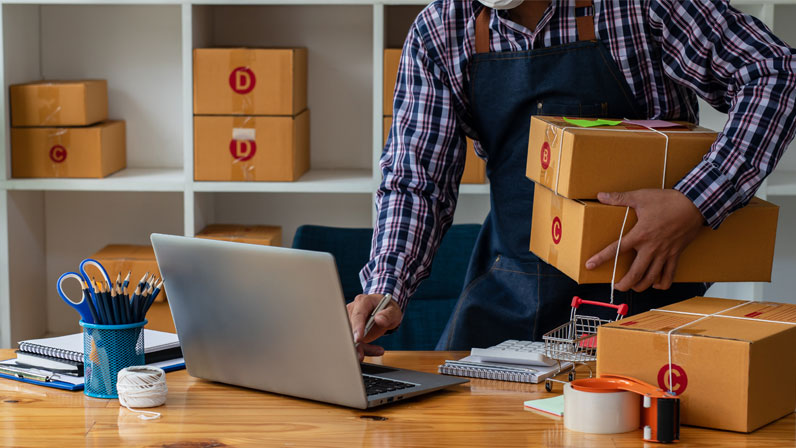As global trade continues to shift, small e-commerce businesses are at a turning point—and that’s a good thing. With rising tariffs and supply chain disruptions, new opportunities are surfacing for nimble brands to win where big-box retailers can’t move fast enough. Domestic manufacturing, reduced international competition, and smarter fulfillment strategies are paving the way for small players to shine. In this blog, we explore how your brand can adapt, grow, and lead with sustainability in today’s changing trade environment.
Article Highlights
- Tariff shifts are disrupting traditional supply chains, but offering growth opportunities for nimble e-commerce brands
- Reduced foreign competition is creating whitespace in consumer goods categories
- Domestic manufacturing supports speed-to-market, quality control, and stronger brand loyalty
- 3PL fulfillment partners help streamline inventory management, packaging, and last-mile delivery
- A shift to domestic sourcing also supports environmentally conscious business practices
Tariffs: Turning Obstacles into Opportunity
Tariffs—once viewed primarily as hurdles—are becoming catalysts for transformation. For small e-commerce businesses, the rising cost of imported goods is forcing a reassessment of sourcing strategies. But within this shake-up lies an opportunity: by pivoting toward domestic production, small brands can reduce dependency on foreign manufacturers, avoid tariff volatility, and build a more resilient operation.
Increased import duties have made once-affordable overseas goods more expensive and less predictable to procure. This change has especially hit consumer goods categories—like home decor, apparel, kitchenware, and beauty products—where many small businesses source items internationally. As those prices climb, space is opening in the online marketplace for domestic brands that can meet demand more quickly, with consistent quality and faster delivery.
Brands that can navigate these shifts creatively and confidently will be best positioned to thrive, not just survive.
Less Competition, More Opportunity
One overlooked benefit of this shift is the growing whitespace left behind by foreign e-commerce sellers who are pulling back due to tariffs, customs delays, and tightened regulatory scrutiny. This creates room for domestic sellers to step in and serve markets that once felt overcrowded.
Small businesses with U.S.-based operations and production are now finding it easier to gain traction on platforms like Amazon, Etsy, and Walmart Marketplace—especially in categories like consumer electronics accessories, kitchen items, wellness goods, and children’s toys. With fewer international competitors undercutting prices or flooding search results, your product listing has a better chance to stand out in the online marketplace.
This isn’t just theory—small U.S. businesses are already seeing the payoff. For example, a niche candle brand in the Midwest saw a 35% sales increase after sourcing jars and wax locally instead of from China, allowing them to market themselves as a "Made in the USA" company with fast delivery and zero import issues.
Now, even previously saturated categories are seeing renewed demand for fresh domestic offerings. Where mass-produced products once dominated, thoughtful design, quick delivery, and local appeal are creating brand-new lanes for smaller sellers in the growing world of online shopping.
Why Domestic Manufacturing Makes Sense
Shifting to domestic production isn’t just about avoiding tariffs. It’s a strategic realignment that brings long-term benefits across your entire business model.
- Supply Chain Resilience
Global supply chains remain vulnerable to port congestion, political shifts, and fluctuating fuel prices. Domestic manufacturing gives small businesses more control and stability. Shorter lead times reduce reliance on lengthy international shipping cycles and allow you to respond faster to customer demand.
What once took 60–90 days to manufacture, ship, and clear customs can now be completed domestically in weeks or even days. This speed makes a critical difference in keeping shelves stocked, online orders fulfilled, and customer expectations met—especially in the fast-paced world of online shopping.
- Product Quality and Brand Trust
Being closer to your manufacturing operation enables tighter quality control. When customers receive products that meet or exceed expectations, they come back—and tell others. High-quality domestic products also create a compelling brand story that resonates with values-driven consumers.
Customers are more likely to associate domestic products with craftsmanship and care. This perception is powerful—especially when trust and quality are just as important as price.
- Consumer Appeal of “Made in USA”
Many consumers are consciously shopping American-made products. Whether for ethical or environmental reasons, buyers are increasingly choosing local brands. Small e-commerce businesses can leverage this by showcasing their commitment to local sourcing and sustainable production.
According to a 2024 consumer report, 63% of online shoppers said they were more likely to buy from a brand if it clearly labeled its products as "Made in the USA." This trend is gaining momentum, especially among Gen Z and Millennial audiences.
- Faster Innovation
Proximity to production means faster prototyping, quicker product updates, and an easier path to testing limited editions or seasonal variations. In an era where personalization and uniqueness drive online shopping trends, this kind of flexibility is invaluable.
Domestic manufacturing supports agile product development—whether it’s testing eco-friendly ingredients in skincare, or launching a seasonal drop of limited-run designs for a home goods collection.

A More Environmentally Conscious Way to Do Business
For many small brands, sustainability is no longer a “nice-to-have”—it’s a non-negotiable. Today’s consumers are seeking out companies that align with their values, especially when it comes to environmental impact. Moving toward domestic manufacturing and fulfillment isn’t just efficient—it’s more eco-friendly.
Fewer Emissions from Transport
Overseas shipments typically require fuel-intensive ocean freight and air transport. By producing goods locally, businesses reduce carbon emissions significantly. Local fulfillment centers also mean products travel shorter distances to reach customers, lowering last-mile emissions.
Less Packaging Waste
International shipments often require multiple layers of packaging to withstand long-distance travel and customs checks. Domestic production allows for streamlined packaging—fewer materials, less plastic, and more recyclable content. Small brands can embrace minimalist, eco-conscious packaging without sacrificing protection or aesthetics.
Supports Circular Economy Practices
Local production can make it easier to incorporate recycled or upcycled materials, offer refill programs, or implement take-back initiatives. For example, a local skincare brand might collect empty containers for reuse or recycling, creating a closed-loop system that would be cost-prohibitive with global logistics.
Strengthens Community-Based Supply Chains
Working with a nearby supplier and fulfillment partner supports local economies while reducing the environmental toll of long-distance sourcing. It’s a more holistic, responsible way to grow.
When brands highlight their sustainability wins—like lower emissions, eco-friendly materials, or reduced waste—they appeal to eco-conscious consumers and build deeper loyalty during their online shopping journey.
Realignment Through a 3PL Fulfillment Partner
Transitioning to domestic production is just one half of the equation. To fully take advantage of reduced lead times and closer supplier proximity, businesses must rethink fulfillment and distribution strategies—and that’s where third-party logistics (3PL) comes in.
A reliable 3PL partner can handle storage, inventory, pick-and-pack services, packaging, and last-mile delivery—all while giving you visibility into real-time stock levels and shipment status. For small e-commerce brands, outsourcing fulfillment to a 3PL offers:
- Scalability without investing in your own warehouse space
- Faster shipping from centrally located distribution centers
- Professional packaging that reinforces your brand experience
- Seamless returns management, reducing customer friction
Importantly, a sustainability-focused 3PL can also help reduce your environmental footprint by offering recycled packaging, energy-efficient facilities, and consolidated shipping to reduce waste.

Marketing Advantages of Local Production
Domestic manufacturing doesn’t just boost efficiency—it’s a marketing goldmine. Small e-commerce brands can build powerful narratives around their commitment to local communities, sustainability, and quality craftsmanship.
These stories can be woven into product pages, social media, email campaigns, and even product packaging. Taglines like “Locally crafted, nationally loved”, “Eco-friendly and made close to home”, or “Sustainably sourced. Responsibly fulfilled.” speak to the heart of conscious consumers navigating the crowded online marketplace.
Social Media platforms like TikTok and Instagram favor authenticity, and behind-the-scenes glimpses of your domestic and sustainable operations—whether it’s a recycled packaging station or a small local factory—can drive engagement and consumer trust.
Even a quick Instagram Reel showing the distance your product travels—compared to its overseas alternative—can become share-worthy content. Highlighting your values builds an emotional connection with your audience, encouraging loyalty that extends beyond a single transaction.
Conclusion
For small consumer goods e-commerce brands, the challenges posed by shifting tariffs and disrupted global supply chains are also opening doors to innovation, growth, and greater sustainability. Domestic manufacturing is more than just a way to cut costs or simplify logistics—it’s an opportunity to future-proof your brand, align with conscious consumer values, and build a deeper connection with your customers.
By reducing reliance on international suppliers and working with partners who support efficient, eco-conscious fulfillment, small businesses can become more agile, more ethical, and more prepared for long-term success. The brands that embrace these shifts now won’t just weather today’s trade storm—they’ll come out ahead.
How Jillamy Can Help
At Jillamy, we help small businesses move with the market—and lead with purpose. Our full-service 3PL solutions are built to support domestic production, smart fulfillment strategies, and sustainable growth.
We offer:
- Strategically located U.S. warehouses
- Eco-friendly packaging and kitting
- Inventory and order management
- Efficient last-mile delivery and returns processing
Whether you’re looking to transition your sourcing, grow your footprint, or scale with less waste, we’ve got the tools—and the team—to help you thrive in today’s online marketplace.
Contact Jillamy today to learn how we can support your next phase of smarter, greener growth.


